Milan Fashion Week Men’s A/W 2024: Prada to Zegna
The very best of Milan Fashion Week Men’s A/W 2024, from Prada’s clash between man and nature to colourful mounds of cashmere at Zegna
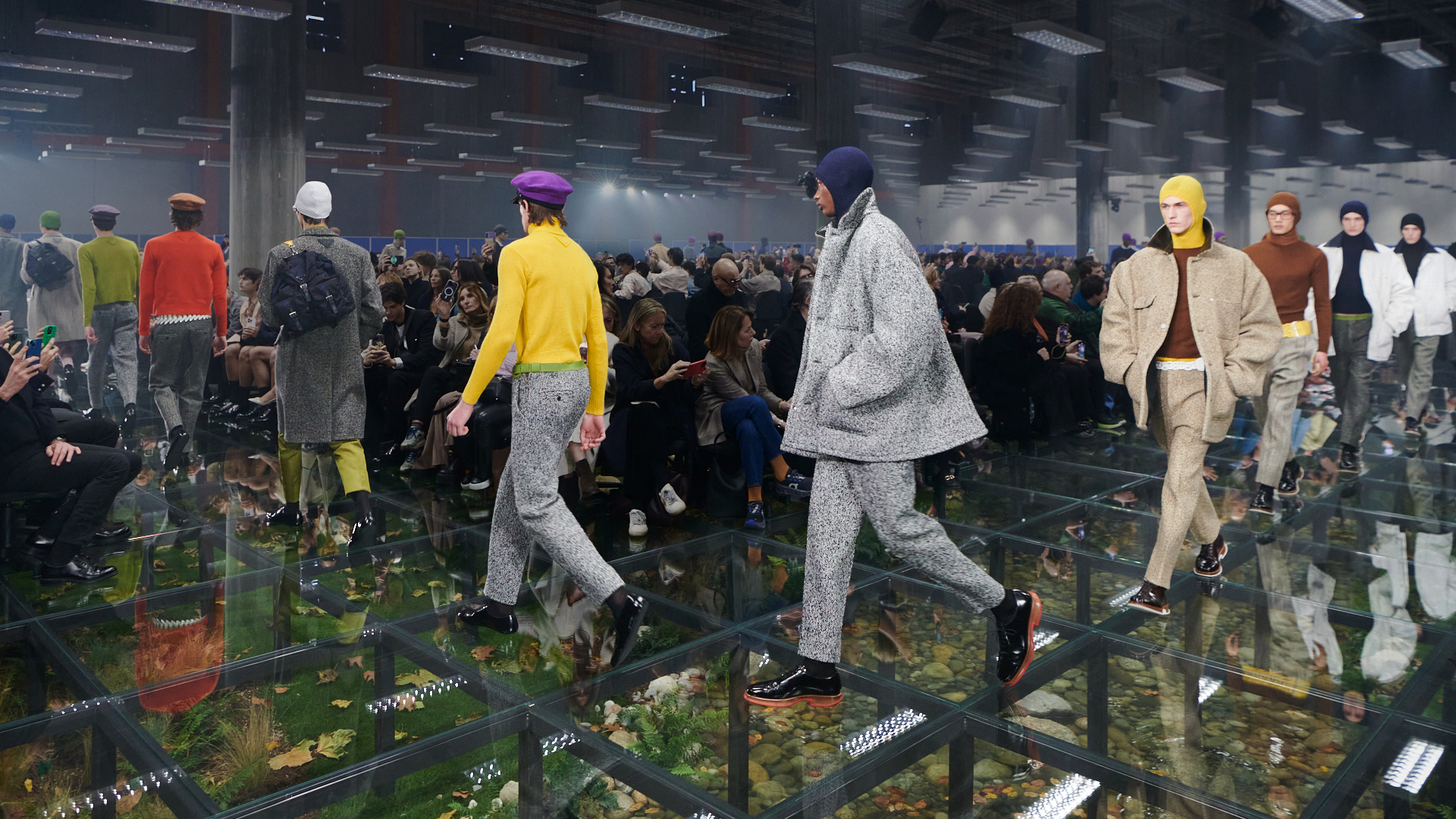
Last week marked the arrival of Milan Fashion Week Men’s A/W 2024, a four-day event which as ever promised a blueprint for how men will dress in the season ahead – from the richly sartorial to the boldly experimental. On the first day, all eyes were on Sabato De Sarno – the Gucci creative director showed his debut menswear collection for Gucci, infused with an easy sensuality – and Stone Island, the cult Italian label holding its own first runway show, despite being founded in 1982.
Elsewhere, JW Anderson returned to Milan to show a menswear collection which looked to Stanley Kubrick’s 1999 thriller Eyes Wide Shut for inspiration – including a collaboration with Kubrick’s wife Christiane, an artist – while Prada followed up its viral slime-drenched runway with another equally transporting show set which clashed the corporate office with the great outdoors. Shows and collections from Dolce & Gabbana, Emporio Armani and Giorgio Armani, Tod’s, MSGM and Zegna (among others), rounded out the week, the latter closing the week on January 15, 2024.
Here, the very best of Milan Fashion Week Men’s A/W 2024, as it happened.
The best of Milan Fashion Week A/W 2024
Zegna
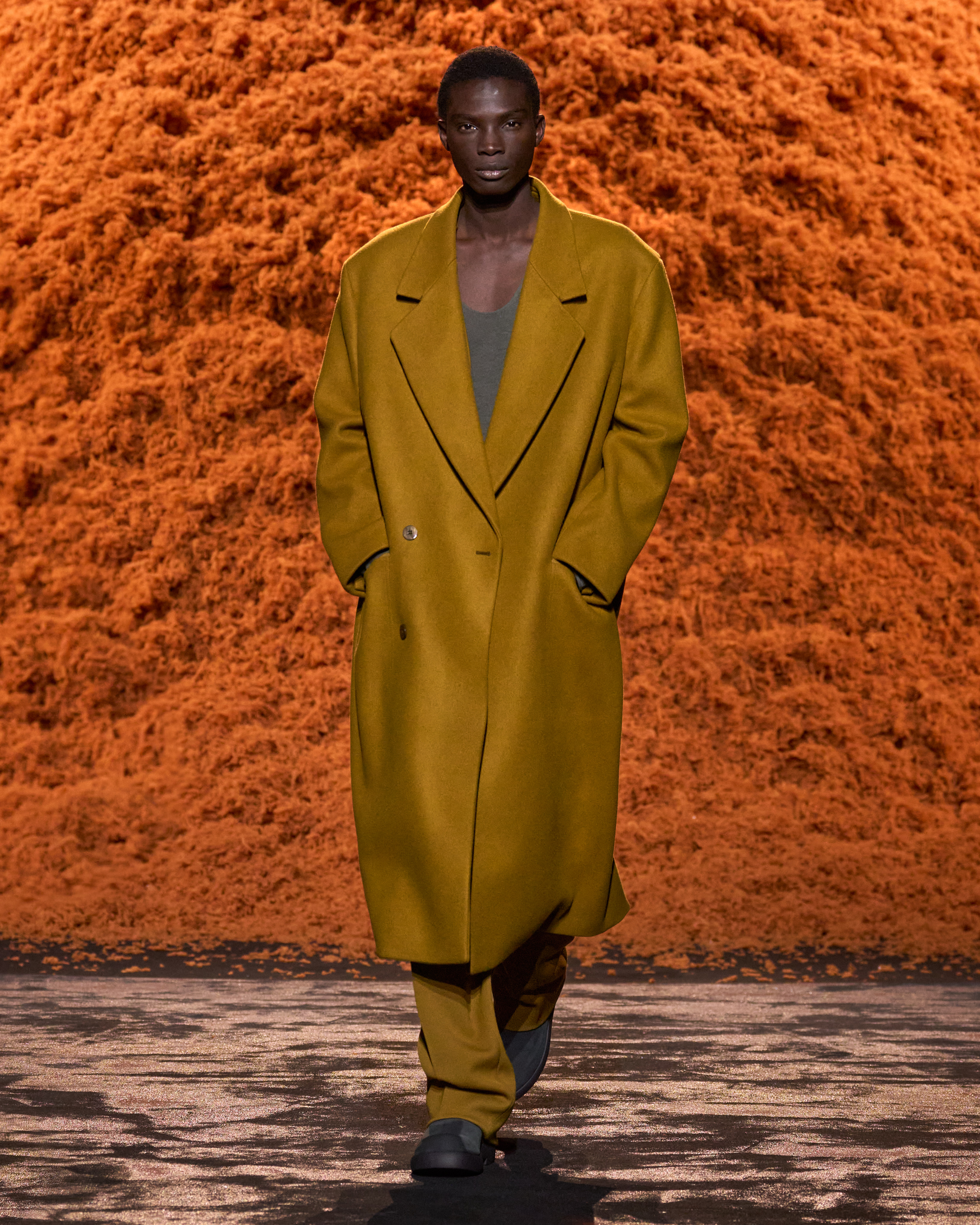
Zegna A/W 2024
The centrepiece of Zegna’s latest show – held at the sweeping Allianz MiCo convention centre in Milan – was an enormous mound of saffron-orange cashmere. Cashmere is a fabric at the heart of Zegna’s output; for winter, Alessandro Sartori wanted to give it particular focus, deeming it the ideal fibre for the particular demands of the season. Titled ‘In the Oasi of Cashmere’, the collection’s name referred to Oasi Zegna, the house’s nature park on the site of its first-ever wool mill and the spiritual home of the house. ‘As both a physical place and a mindset [it is] the centre of our world, a veritable lab: a place in which we can tirelessly explore new fabrications, develop new forms,’ said the designer.
As such, in the garments themselves, Sartori thought about the idea of transformation and experimentation, though evolution might be a more apt word: his languid silhouettes, which meld a feeling of ease with the luxurious fabrications each look is crafted from, build piece by piece on the season prior. A through line could be drawn from S/S 2024 (where befitting the season, linen was the central fabric) to this latest collection in the gently oversized and minimally adorned garments, built by clever layering. Highlights for A/W 2024 included a slew of beautiful double-breasted overcoats, amplified in proportion to envelop the body, while suiting came with elegant wide-legged trousers which nonetheless recalled sweat pants in their ease. Though it was Sartori’s use of colour which remained the collection’s most seductive element, a rich and evocative palette of grey, browns and whites with flashes of blue and pink, the latter inspired by the pink walls of Alba cathedral in Piedmont.
JW Anderson
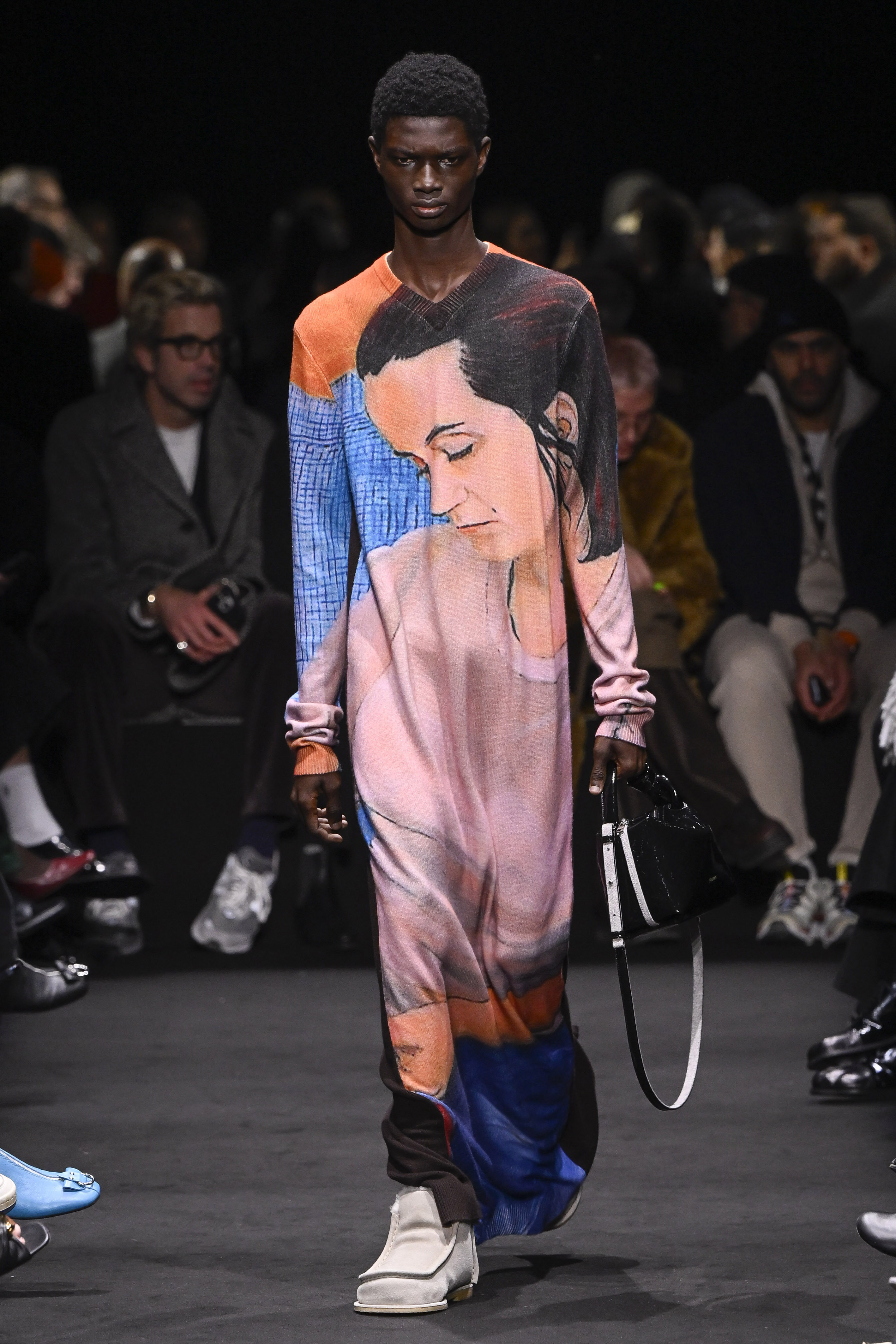
JW Anderson A/W 2024
In the run-up to the show, Jonathan Anderson had been posting stills from Stanley Kubrick’s 1999 movie Eyes Wide Shut, the director’s final film. Its erotic charge provided the impetus for the designer’s latest menswear collection; in particular, the paintings of Christiane Kubrick – the director’s wife – which appear amid the film’s interiors (and have prompted much commentary about their potential secret meanings and codes). A number of these works were used in the collection itself, adorning elongated knit dresses or printed onto handbags, a project undertaken with the artist’s involvement. ‘I thought it was interesting to bring something into the foreground that ultimately doesn’t want to be there,’ he said. It lent the collection the underlying strangeness which pulsates through the movie; here, models were largely stripped from the waist down, wearing just fine denier tights, while shorts and cardigans had bulges of rolled satin emerging from beneath. Poinsettia decorations adorned several of the looks (Anderson admitted the Christmas plant provokes a kind of disgust from him), while womenswear looks wrapped elegantly around the body in tones of red and black. It made for a seductive, intriguing offering from the designer: ‘Everything is off,’ read the collection notes.
Tod’s
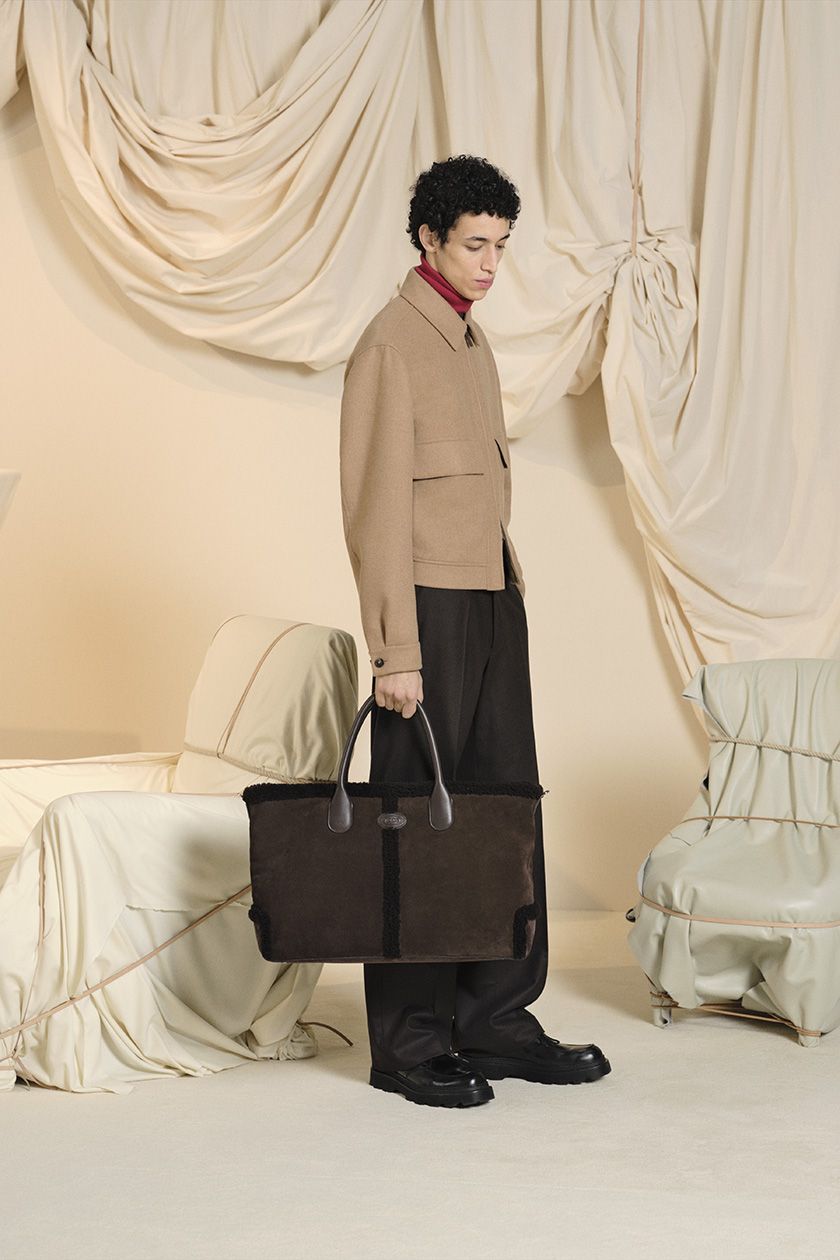
Tod’s A/W 2024
Tod’s chose to present its ‘Pashmy’ project as part of men’s fashion week – a selection of garments which comprises the ‘most exclusive and precious’ materials that the Italian house uses. As such, the presentation itself marked a celebration of craft (through one window a disembodied pair of hands created one of the brand’s signature loafers). The collection itself, meanwhile, comprised the ‘Pashmy’ bomber, a clean-lined style complete with water- and stain-repellant treatments, while other pieces riffed on men’s wardrobe archetypes, from ecru collared cardigans and louche tailoring to shearling and leather bombers. Accessories, meanwhile, included the 90s-born ‘Di Bag’ in sheepskin leather, a long-fur version of the Bubble Gommino driving show, and a new pair of sneakers which draw inspiration from saddle-stitching.
Wallpaper* Newsletter
Receive our daily digest of inspiration, escapism and design stories from around the world direct to your inbox.
Prada
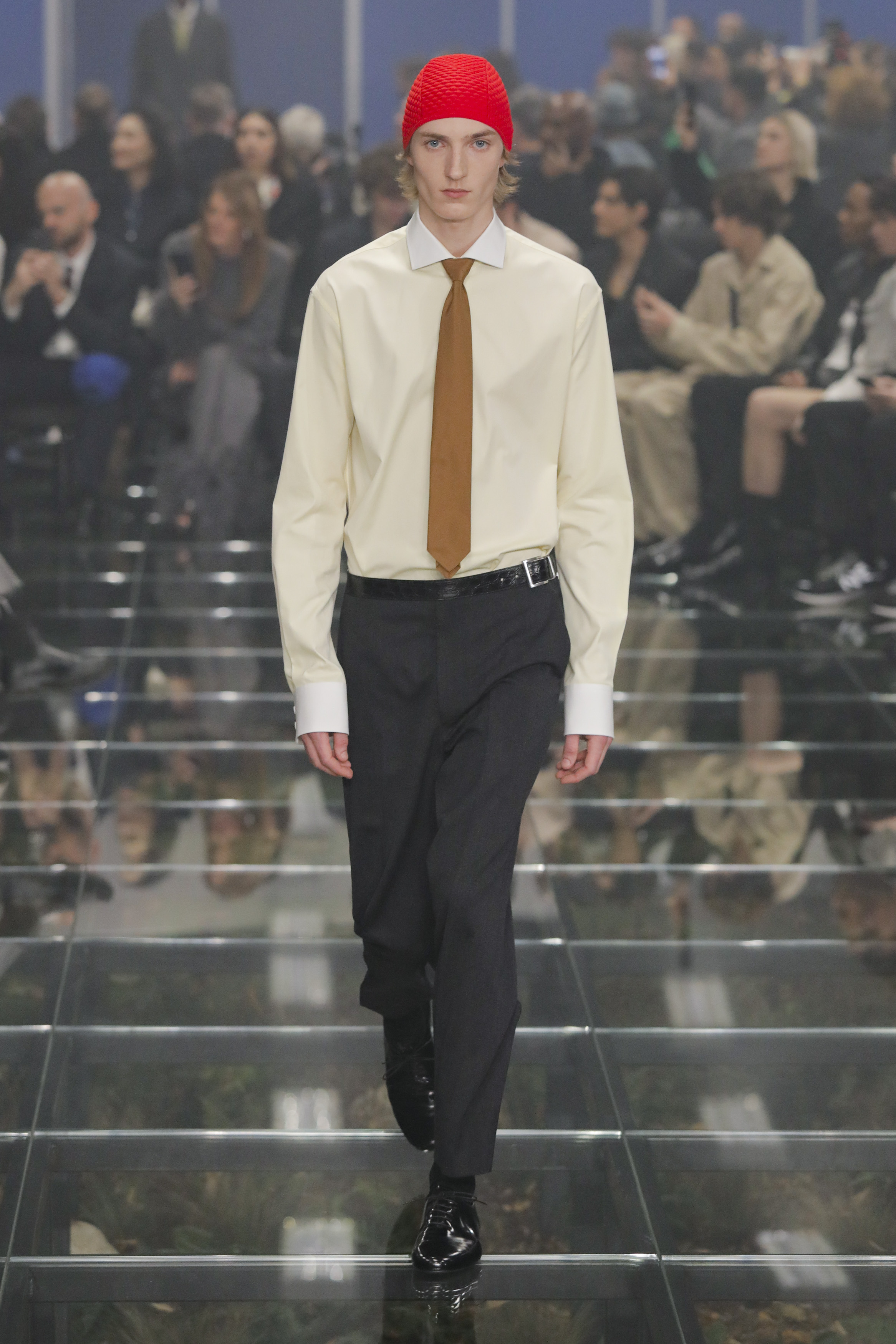
Prada A/W 2024
The invitation for Prada’s latest show – which opened like an enormous book – comprised a silk tie encased in an image of a forest. It was a symbolic dichotomy which ran throughout their latest collection: the clash between man and nature, the office and the forest floor. Indeed, after walking through a simulacrum of a nondescript office space (complete with spinning desk chairs and computers which buzzed with the Prada logo), guests entered the main runway where a vast perspex floor hovered over an expanse of grass, fallen leaves and babbling brooks of running water. Conceived alongside Rotterdam-based AMO, the effect was extraordinarily surreal – backstage Miuccia Prada noted she found the effect to be ‘scary’ – and captured the strange juxtaposition which ran through the collection itself. ‘Office and nature, inside and out, the instinctive change of people shifting between these opposite spheres,’ explained Raf Simons, the brand’s co-creative director.
So here, the pair melded a distinctly Prada-esque riff on the corporate uniform – during their joint tenure, the uniform is something that Miuccia Prada and Simons have returned to most often – with moments that suggested being out of doors, from enormous double-breasted sailor coats to plays on the tweed overcoat and trench (the latter narrow and zipping high up the neck). The heady shift between the elements, enlivened by an electric use of colour, suggested an underlying tension at the heart of the collection. As our environment changes, how much do seasons matter? In a quote sent out prior to the show, Miuccia Prada referenced Stravinsky’s ‘The Rite of Spring’, a work of music which heralded such a moment of change that when it was first shown, the audience purportedly rioted. ‘The changing of seasons enables human beings to continue to look at the world with fresh eyes,’ she said. ‘“The Rite of Spring” has inspired generations of musicians to reinvent themselves… the seasons have been the most consistent theme in all schools of painting. Fashion aspires to the same effect of renewal.’
‘It was meant for going outside,’ she elucidated further backstage, noting that amid the thrum of contemporary life, there was a desire to return to something more tangible. ‘Normally I don’t do seasons – naked in winter – but now, there’s a need to connect with reality, with human nature.’
Emporio Armani
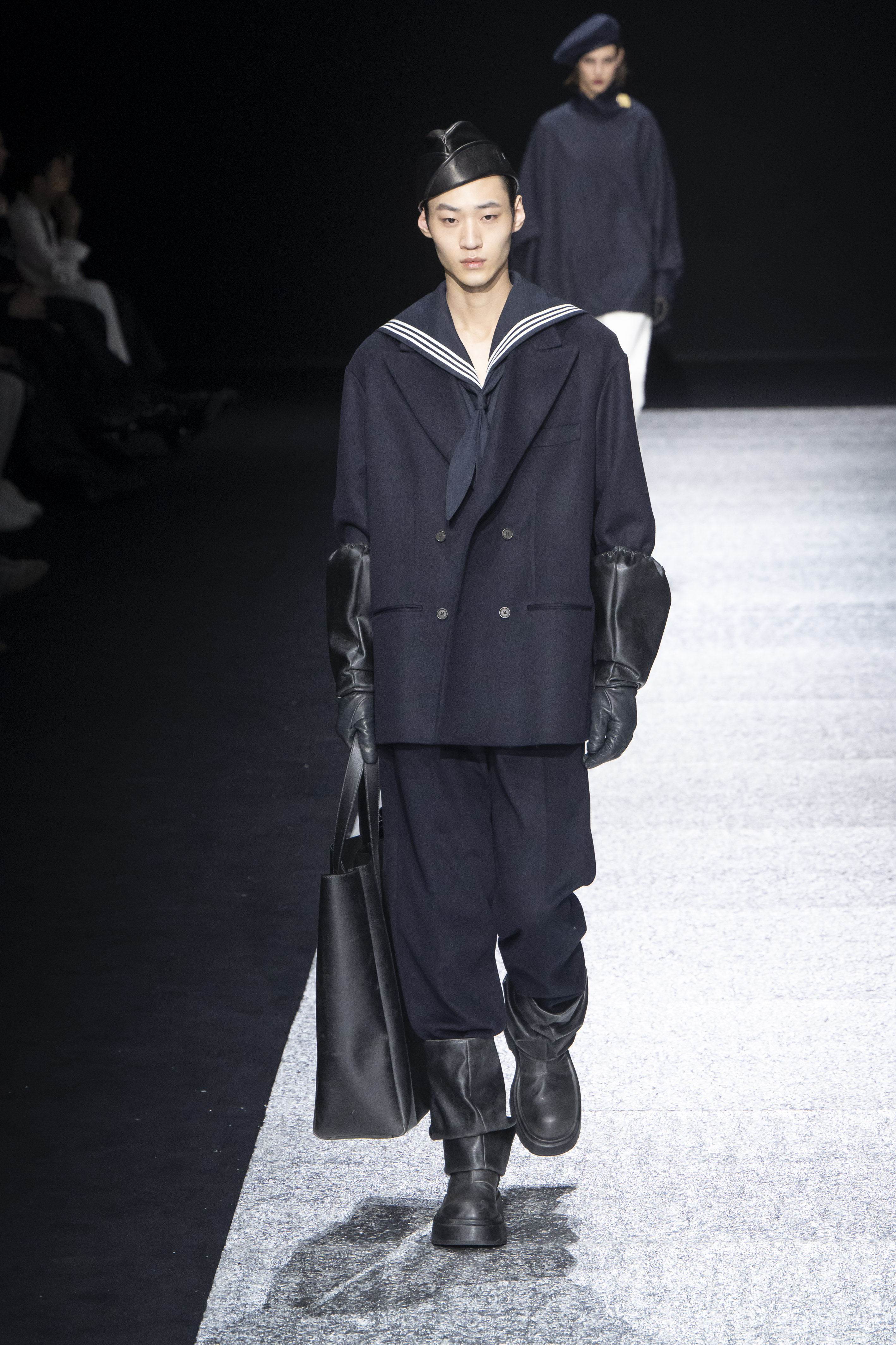
Emporio Armani A/W 2024
As the lights went up at the Tadao Ando-designed Armani/Teatro, an enormous lighthouse was revealed, its spinning lamp drifting across the gathered crowd. Giorgio Armani – who made his Emporio Armani collection co-ed this season, showing a mix of men’s and womenswear – said that for this latest collection he had been thinking about the ‘impetuous’ sea in winter. As such, the designer noted a mood of adventure to the collection, an ode to ‘sailors, cabin boys, engineers and officers’ who take the high seas even at their most treacherous. As such, nautical hallmarks ran throughout, whether sailor hats or shirts, galosh-style gloves and boots, or cocooning, broad-shouldered navy overcoats (indeed, the strong shoulder ran throughout). A more sedate vision of ‘harbourside elegance’, meanwhile, provided opportunities for Mr Armani to indulge in the louche glamour for which he is known: the collection’s climax was a series of richly bejewelled or embroidered capes and tailoring. The ‘decorative flavour’ of these pieces, said Mr Armani, were inspired by the building layers of incrustations found on the underside of ships, here transformed in arresting style.
Neil Barrett
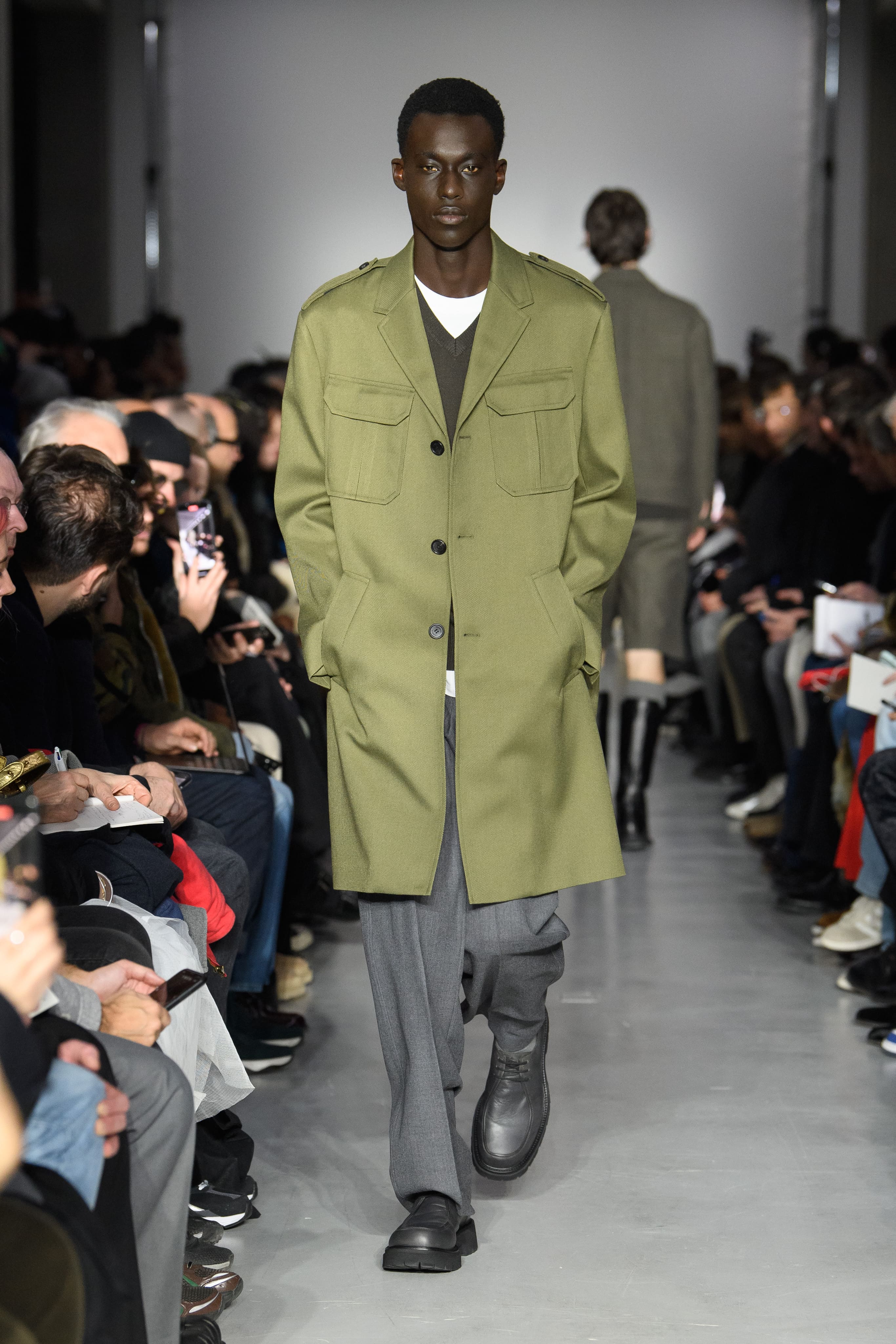
Neil Barrett A/W 2024
Neil Barrett continued his welcome return to Milan Fashion Week – he held his first show in some time last June – with a collection which demonstrated the British designer’s aptitude for sharply defined minimalism. Finding inspiration in heritage garments, particularly military uniforms, he strips the extraneous to create a precise, comprehensive men’s wardrobe (this time, the show’s title was ‘Heritage Innovation’). For A/W 2024, he riffed on traditional British outdoor wear and Harris tweeds (he called his version ‘techno tweed’) in clean-lined single-breasted overcoats, tones of khaki, camel and beige, and tab-fastening leather gloves and riding boots. Elsewhere, he once again looked to what he called ‘the uniforms of modern menswear’, ‘remixed, redesigned [and] rethought’ by the designer, like one particularly desirable camel overcoat with epaulettes and folded military-style pockets. A clean-lined riff on the flight jacket, it encapsulated the fusion of heritage and modernism at the collection’s heart.
Fendi
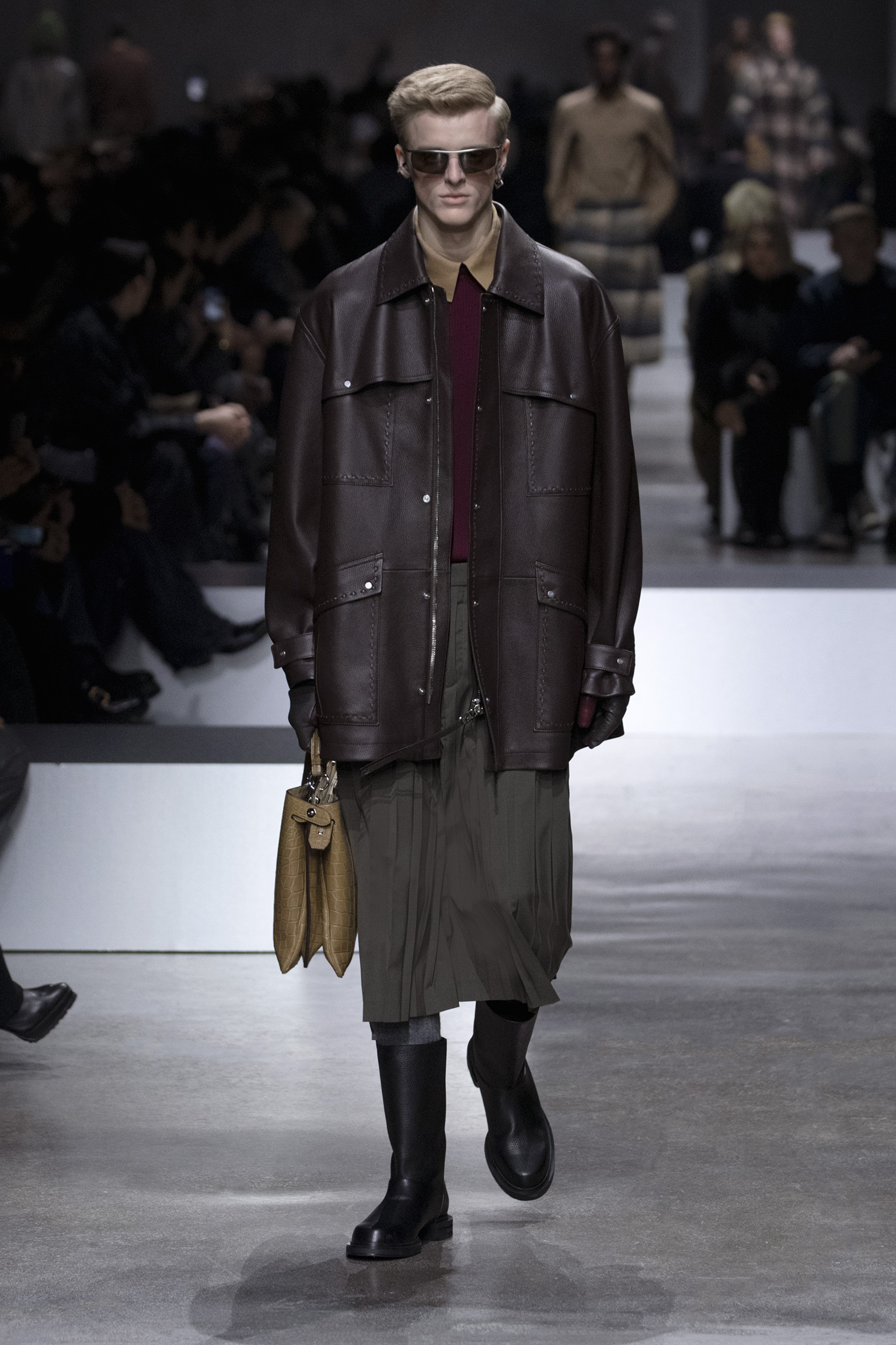
Fendi A/W 2024
Princess Anne was on the mood board for Silvia Venturini Fendi’s latest menswear collection, which once again mined the feeling of levity and play which defines the designer’s menswear offering. She was an apt muse: the collection was a riff on British outdoor wear, a mode of dressing the royal is well versed in, presented here through takes on the pleated kilt (it became a long culotte-style short), wax cotton jackets and a use of various plaids throughout. But there was also the feeling of idiosyncrasy associated with Princess Anne’s style (often, she wears near-futuristic wraparound sunglasses with the most classic of British looks); one unexpected accessory was a pounding sphere-shaped speaker, a collaboration with Devialet and naturally adorned with the house’s double-F logo. The designer said that it was a collection which straddled town and country, noting that alongside the outdoorsy looks was a mood of ‘Roman decadence’, in reference to the house’s home city. Cue trompe l’oeil bombers in soft shaved shearling, perfectly cut leather overcoats, and of course a slew of beautiful tailoring (the final suits imbued with a glimmer of shine).
Dolce & Gabbana
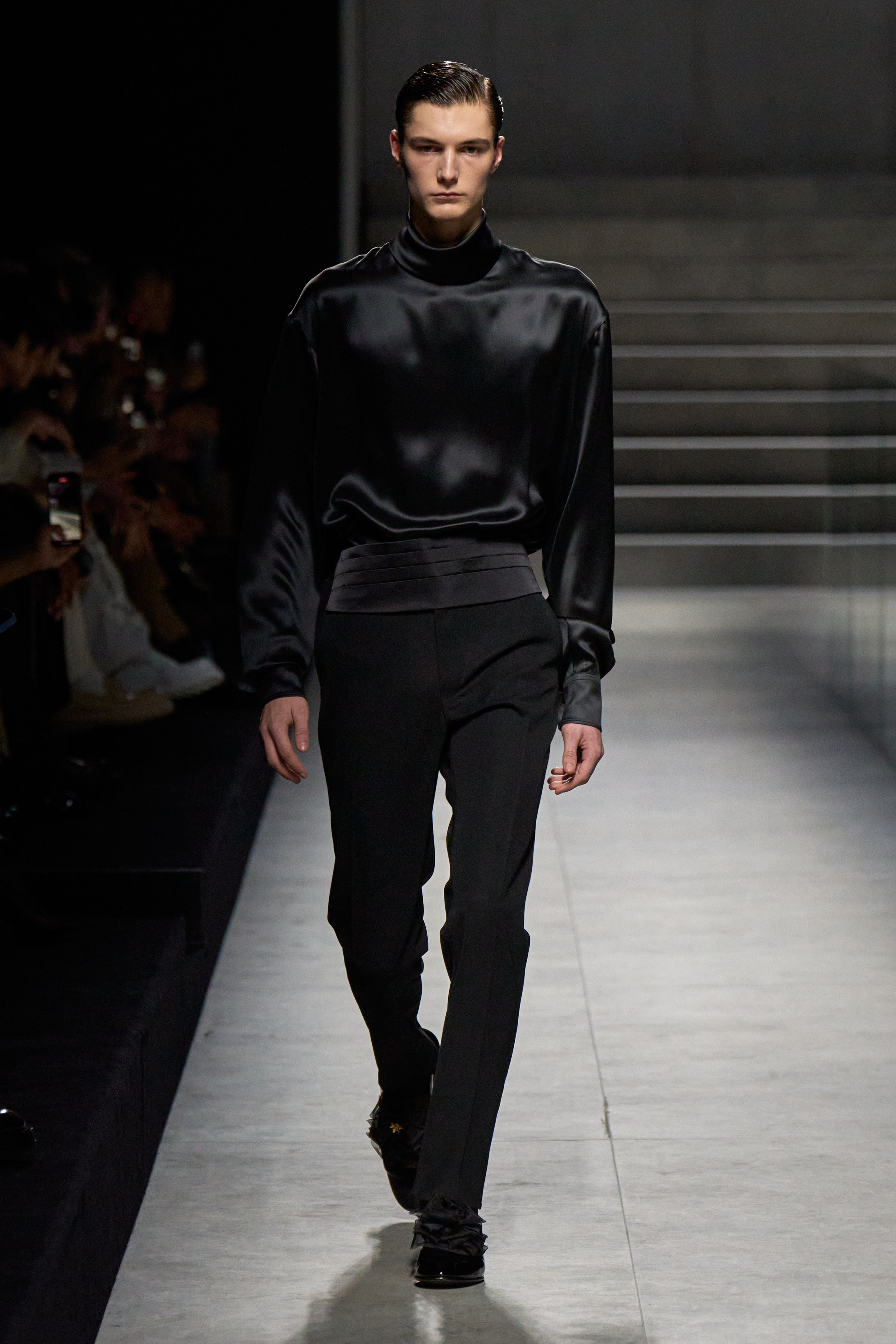
Dolce & Gabbana A/W 2024
Dolce & Gabbana continued a mood of reduction which has been evident at the Italian house in recent seasons, with designers Domenico Dolce and Stefano Gabbana expressing a want to get to back to the essence of the house they founded in 1985. For menswear, this means a fusion of sartorial prowess (their men’s suiting has long been a highlight of their collections), with the oozing sensuality for which the brand is known. Titled ‘Sleek’, they called this collection a ’story of elegance and handmade… a sartorial essay’ which came largely in the house’s signature black. An after-dark mood was struck in louche, diaphanous silk shirting – some high-neck and cinched at the waist with a cummerbund, others with pussy bow fastenings at the neckline – while the tuxedo was riffed on in cropped or sleeveless variations (its elegant line also inspired a series of elegantly cut overcoats). A hint of the equestrian, meanwhile, came in narrow jodhpur-style trousers tucked into riding boots, while worn denim jeans and jackets struck a more casual note. It was completed with the flourishes of drama and abandon for which the designers are known: whether enormous faux fur overcoats or tailoring dripping with beads or paillettes.
MSGM
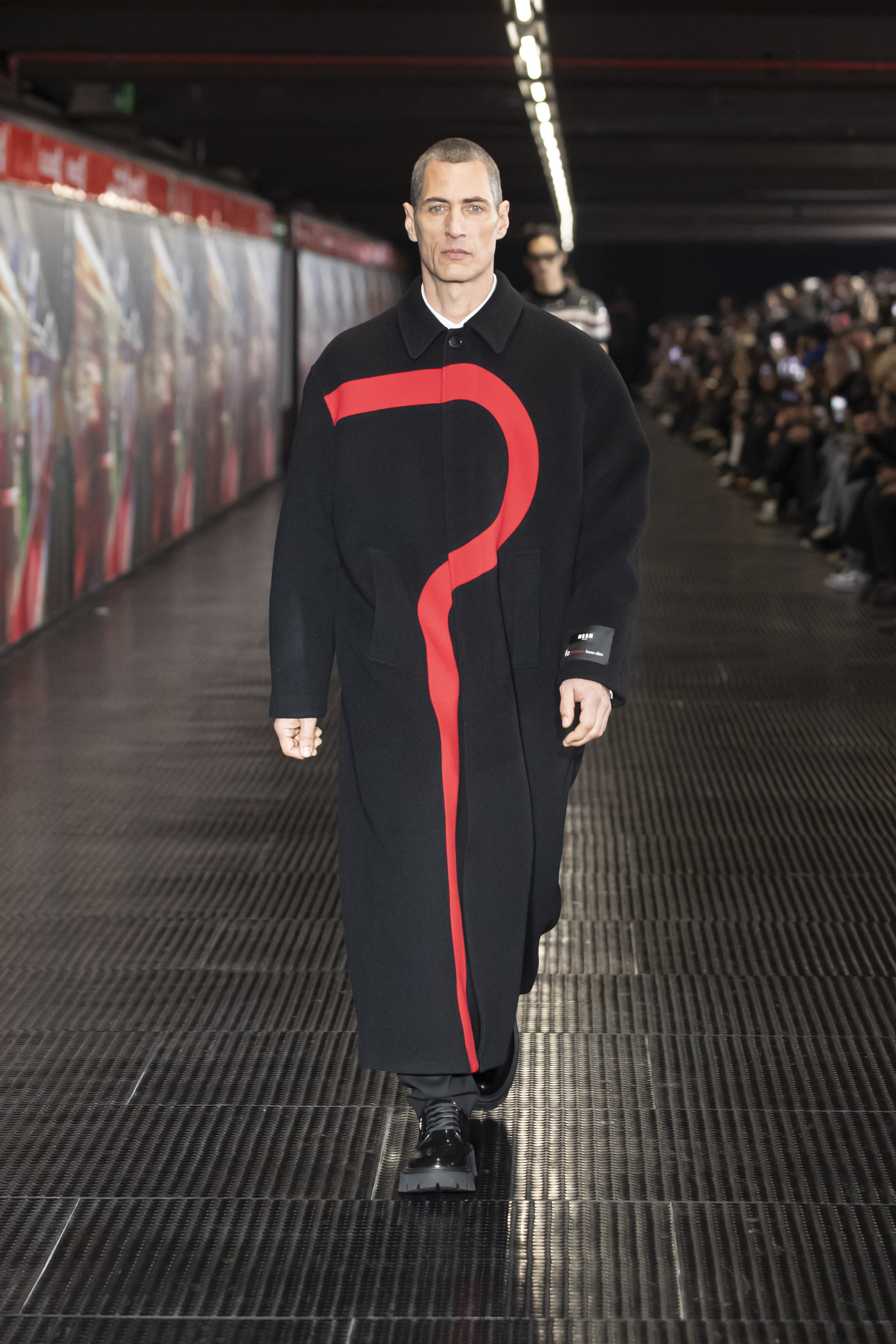
MSGM A/W 2024
Partway through Massimo Giorgetti’s latest menswear show – which took place on the subterranean platform of Porta Venezia metro station – a model walked the runway grasping an unexpected accessory: a chunk of one of the underground system’s distinctive curved handrails. An enduring symbol of Milanese mid-century design, it was created by Franco Albini in 1964, the architect behind the city’s first M1 metro line, inaugurated the same year (Giorgetti is an avid student of design and for this collaborated with Albini’s eponymous foundation of the project). The distinctive curve of the object became a motif in the collection (on the opening look it adorned an overcoat), while representing the line which the M1 route carves across the city. The designer said he chose the metro as a way to explore the ’frenetic’ pace of modern life, seeing models march at speed across the runway, mobile phones clasped in hand. The clothing itself had all the colourful eclecticism for which MSGM is known – padded hoodies and matching pants, fluffy slippers, tinsel knits – while prints included photographs taken using the Google Pixel phone of the Italian metro (the partnership with Google will continue later in the year at Salone del Mobile).
Stone Island
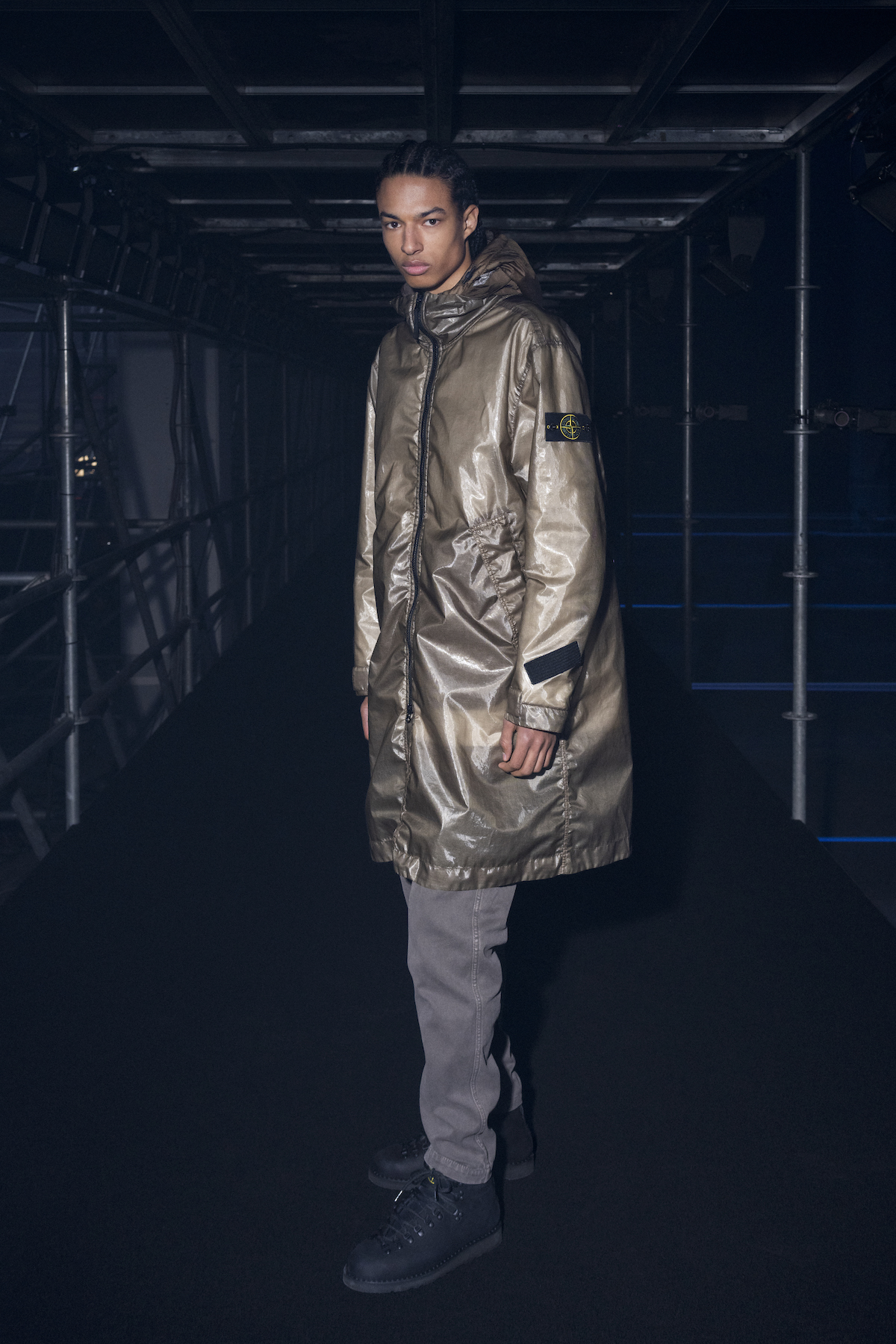
Stone Island A/W 2024
Stone Island’s first runway show was not a runway show at all; rather, as attendees streamed into the vast industrial space, models were already present, clamped in rows onto an enormous scaffolding structure. The effect reminded of their distinct advertising campaigns – whereby models stand square to the camera against a stark white background – though here, they were framed by the scaffold’s metal jousts and glimpsed through a veil of dry ice.
The show itself, with a suitably seat-vibrating techno soundtrack (the Italian outerwear brand has long been adopted by subcultures, from the Milanese Paninari to British ravers), comprised a light show of sorts, whereby glitching, flashing lights illuminated the rows of models, who wore the brand’s A/W 2024 collection. The grand finale was a black curtain which dropped from the ceiling to conceal the models, projected with Stone Island’s compass logo – one of street fashion’s most enduring symbols.
If the curtain went down prematurely – as was revealed after the show – it did little to dampen the spectacle, which captured the label’s underground spirit, revealing a gamut of techy, streetwear-infused pieces (notably, a series of jackets and joggers with a liquidy, almost holographic shine), while appealing to a new market the brand hopes to mine through social media impressions from the evening. Indeed, earlier in the day, Stone Island revealed an S/S 2024 campaign featuring a well-known roster of faces, from actor Jason Statham and choreographer Wayne McGregor, to musician Dave and rising British tennis player Henry Searle. As I drove through Milan to the show, it was already on bus stops and billboards.
Gucci
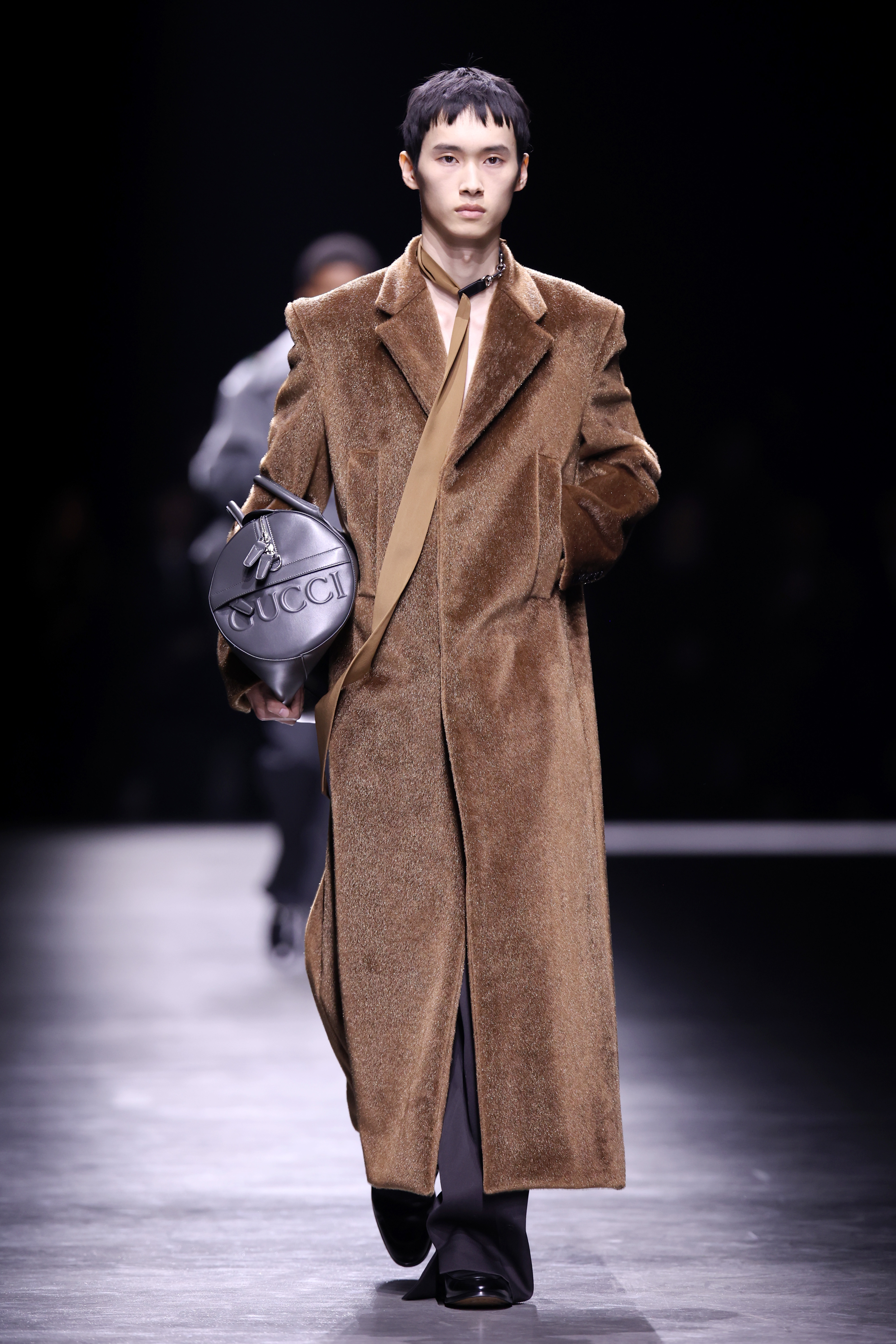
Gucci A/W 2024
Sabato De Sarno continued to hone his vision for Gucci with his debut menswear collection for the house, held in a former factory space on the northern outskirts of Milan. It was a collection infused with the easy, insouciant sensuality which defined his first womenswear collection shown this past September. There, he looked towards the multiplicity of the street for a collection which straddled pragmatism and glamour; pieces ran from luxurious riffs on hoodies, tank tops and denim to crystal babydoll dresses and outerwear adorned with trails of glimmering tassels.
Here, languid tailoring, floor-skimming overcoats and Gucci-adorned bomber jackets (as well as a return of the grey hoodie), met elongated silk ties, flourishes of crystal adornment, and new versions of the chunky Marina Chain necklace, which had originally appeared in the womenswear collection. De Sarno called it ’a mirroring effect’: from the casting (entirely new faces), to the press notes (a declaration that the collection was an attempt to capture ’the joy of life’), and the soundtrack (Mark Ronson‘s remix of Ancora Ancora Ancora by Mina), he noted a desire to replicate ‘the emotions that were felt, this time through the perspective of menswear’.
It asserted his cohesive, wide-ranging vision for the house, one which will no doubt prove particularly seductive to shoppers. But the collection also heralds a break from the unrestrained maximalism of his forebear Alessandro Michele, seeing De Sarno – despite the sometimes heavy weight of expectation – confidently strip back the extraneous towards a more discreet elegance, nonetheless infused with the moments of ’joy, passion and humanity’ that the designer has put forth as the pillars for his renovation of the Italian powerhouse.
Jack Moss is the Fashion Features Editor at Wallpaper*, joining the team in 2022. Having previously been the digital features editor at AnOther and digital editor at 10 and 10 Men magazines, he has also contributed to titles including i-D, Dazed, 10 Magazine, Mr Porter’s The Journal and more, while also featuring in Dazed: 32 Years Confused: The Covers, published by Rizzoli. He is particularly interested in the moments when fashion intersects with other creative disciplines – notably art and design – as well as championing a new generation of international talent and reporting from international fashion weeks. Across his career, he has interviewed the fashion industry’s leading figures, including Rick Owens, Pieter Mulier, Jonathan Anderson, Grace Wales Bonner, Christian Lacroix, Kate Moss and Manolo Blahnik.
-
 Put these emerging artists on your radar
Put these emerging artists on your radarThis crop of six new talents is poised to shake up the art world. Get to know them now
By Tianna Williams
-
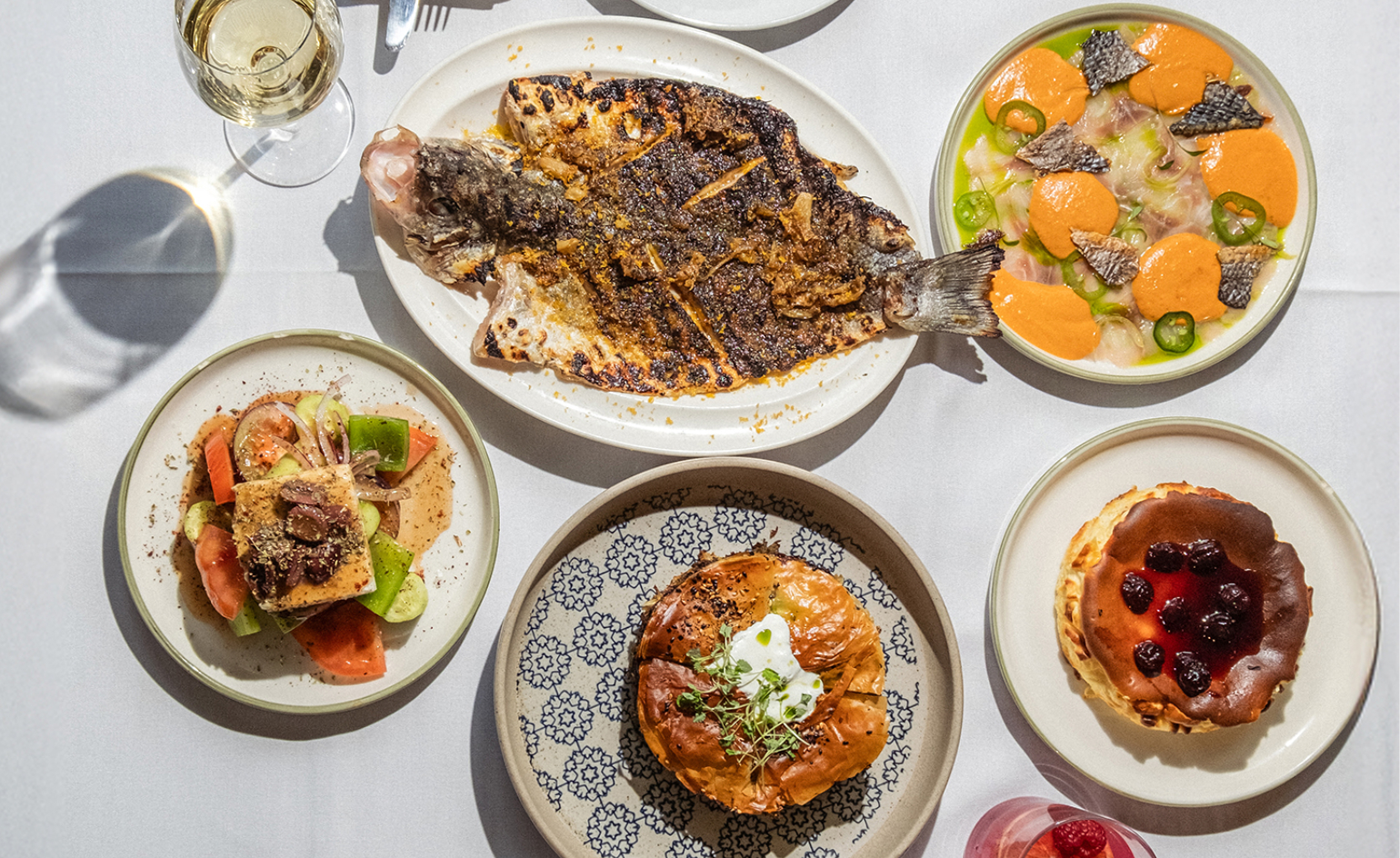 Dining at Pyrá feels like a Mediterranean kiss on both cheeks
Dining at Pyrá feels like a Mediterranean kiss on both cheeksDesigned by House of Dré, this Lonsdale Road addition dishes up an enticing fusion of Greek and Spanish cooking
By Sofia de la Cruz
-
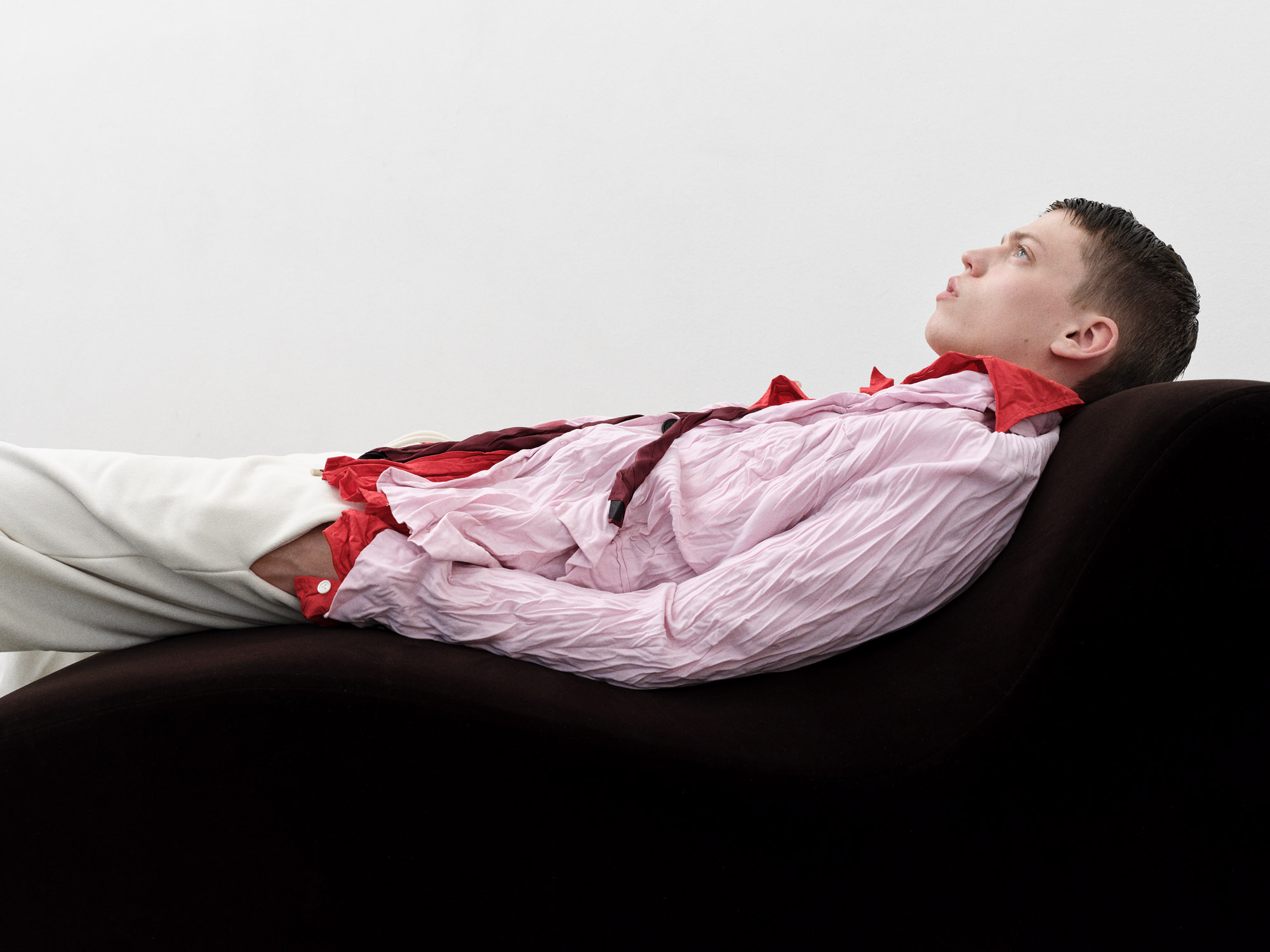 Creased, crumpled: S/S 2025 menswear is about clothes that have ‘lived a life’
Creased, crumpled: S/S 2025 menswear is about clothes that have ‘lived a life’The S/S 2025 menswear collections see designers embrace the creased and the crumpled, conjuring a mood of laidback languor that ran through the season – captured here by photographer Steve Harnacke and stylist Nicola Neri for Wallpaper*
By Jack Moss
-
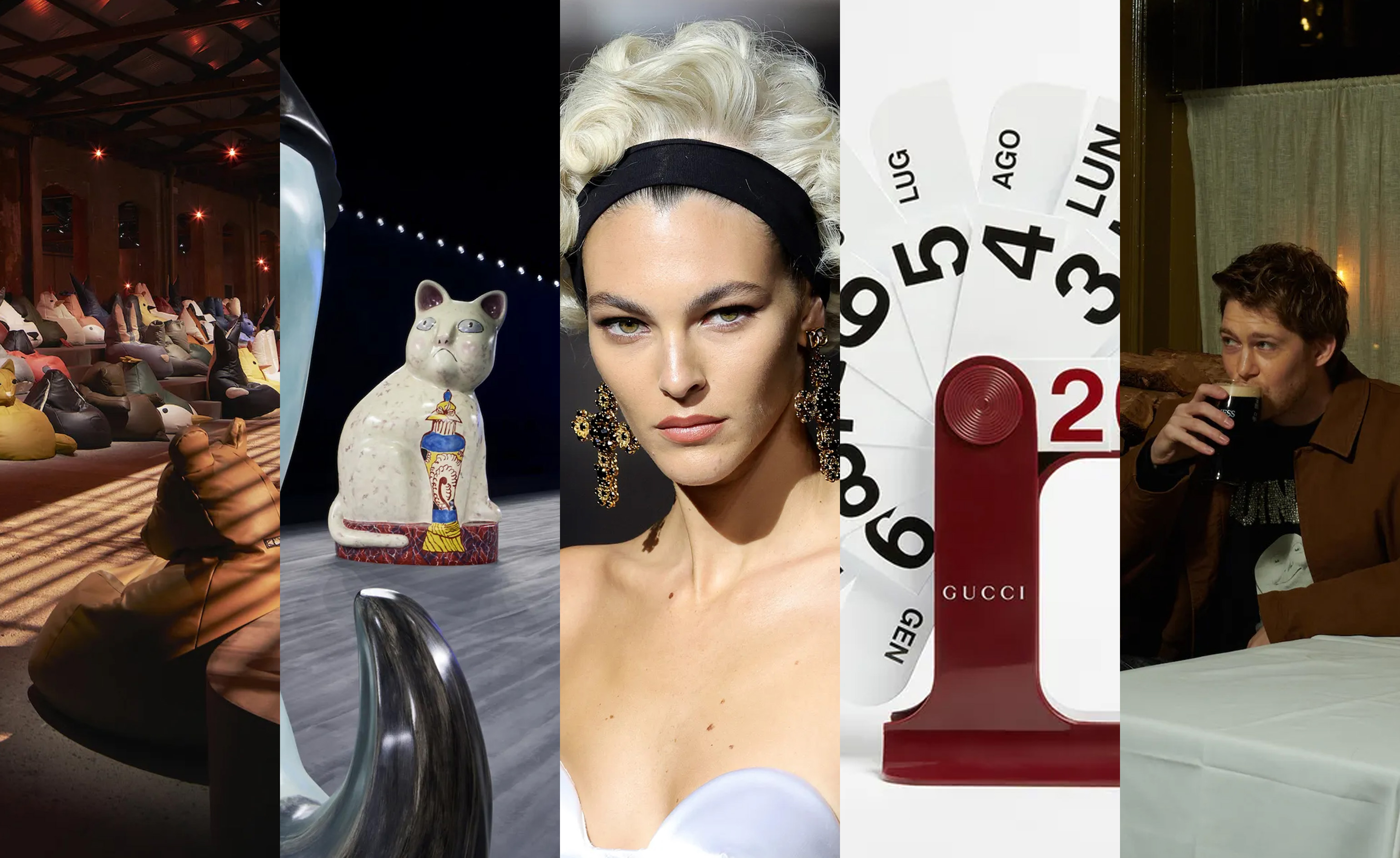 Giant cats, Madonna wigs, pints of Guinness: seven objects that tell the story of fashion in 2024
Giant cats, Madonna wigs, pints of Guinness: seven objects that tell the story of fashion in 2024These objects tell an unconventional story of style in 2024, a year when the ephemera that populated designers’ universes was as intriguing as the collections themselves
By Jack Moss
-
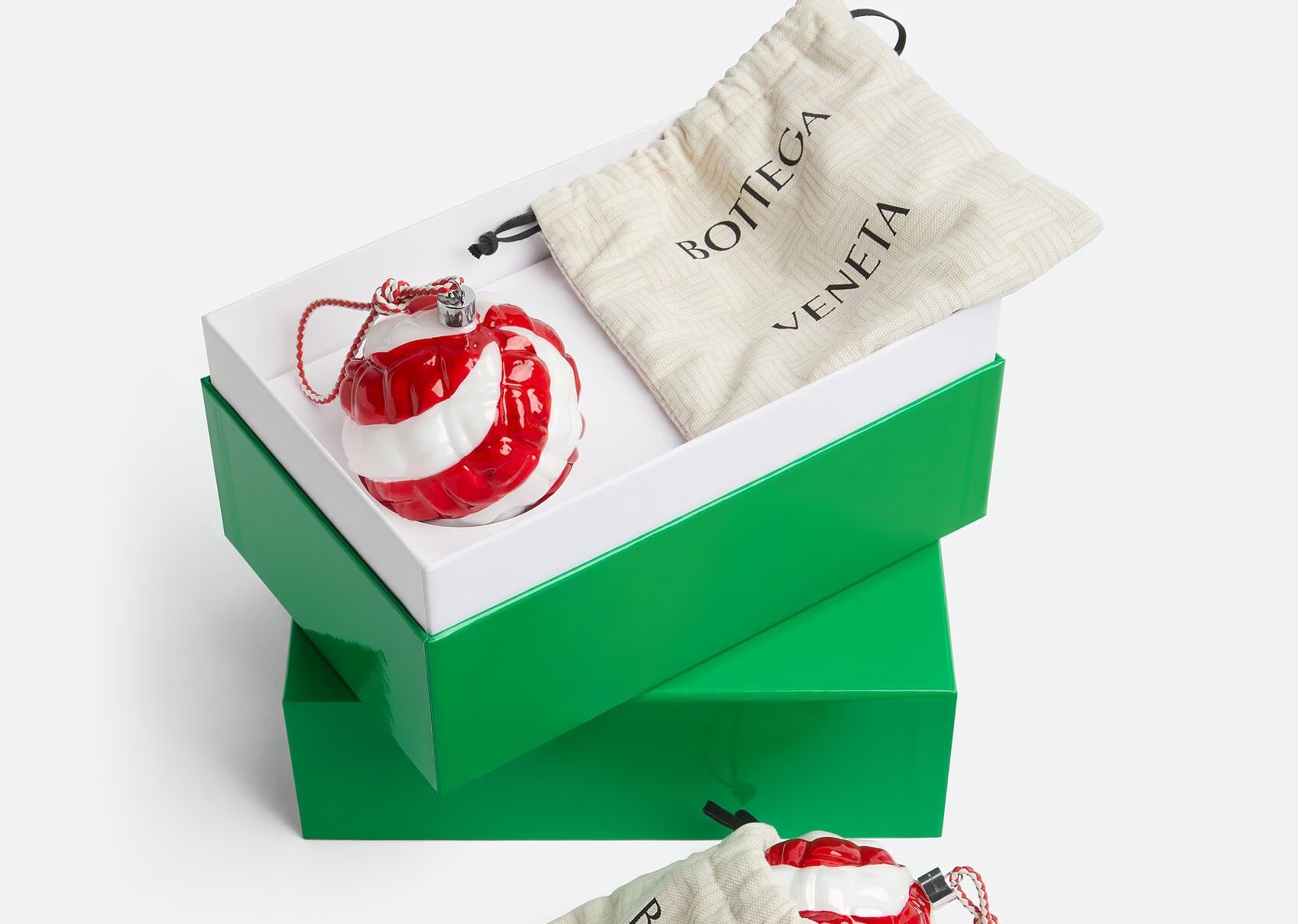 Fashionable Christmas baubles to accessorise this year’s tree, from Bottega Veneta to Loewe
Fashionable Christmas baubles to accessorise this year’s tree, from Bottega Veneta to LoeweSelected by the Wallpaper* style team, a gleaming array of Christmas baubles for fashion fans featuring fantastical designs from Bottega Veneta, Loewe, Prada and more
By Jack Moss
-
 ‘He made something not merely popular, but the rage’: unpacking Elio Fiorucci’s fabulous fashion legacy
‘He made something not merely popular, but the rage’: unpacking Elio Fiorucci’s fabulous fashion legacyAn expansive new retrospective at Triennale Milano explores the colourful life and work of Elio Fiorucci, who is synonymous with 1970s hedonism and glamour
By Zoe Whitfield
-
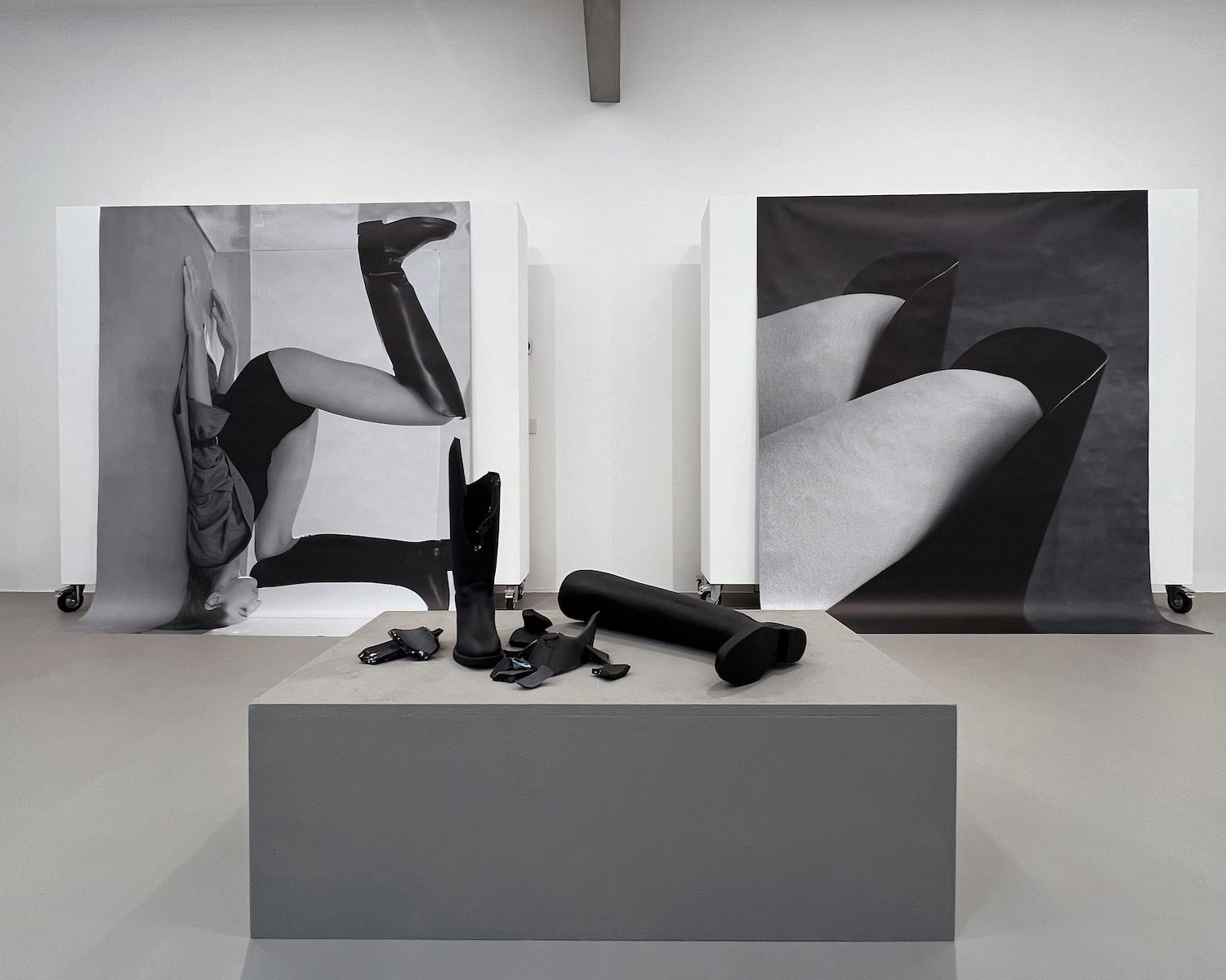 How fashion designer Ilenia Durazzi designed her ‘elegant, rigorous’ Milanese studio – all the way down to the furniture
How fashion designer Ilenia Durazzi designed her ‘elegant, rigorous’ Milanese studio – all the way down to the furnitureIlenia Durazzi of Durazzi Milano tells Wallpaper* the story behind her new Milanese studio, a labour of love built entirely to her exacting design
By Jack Moss
-
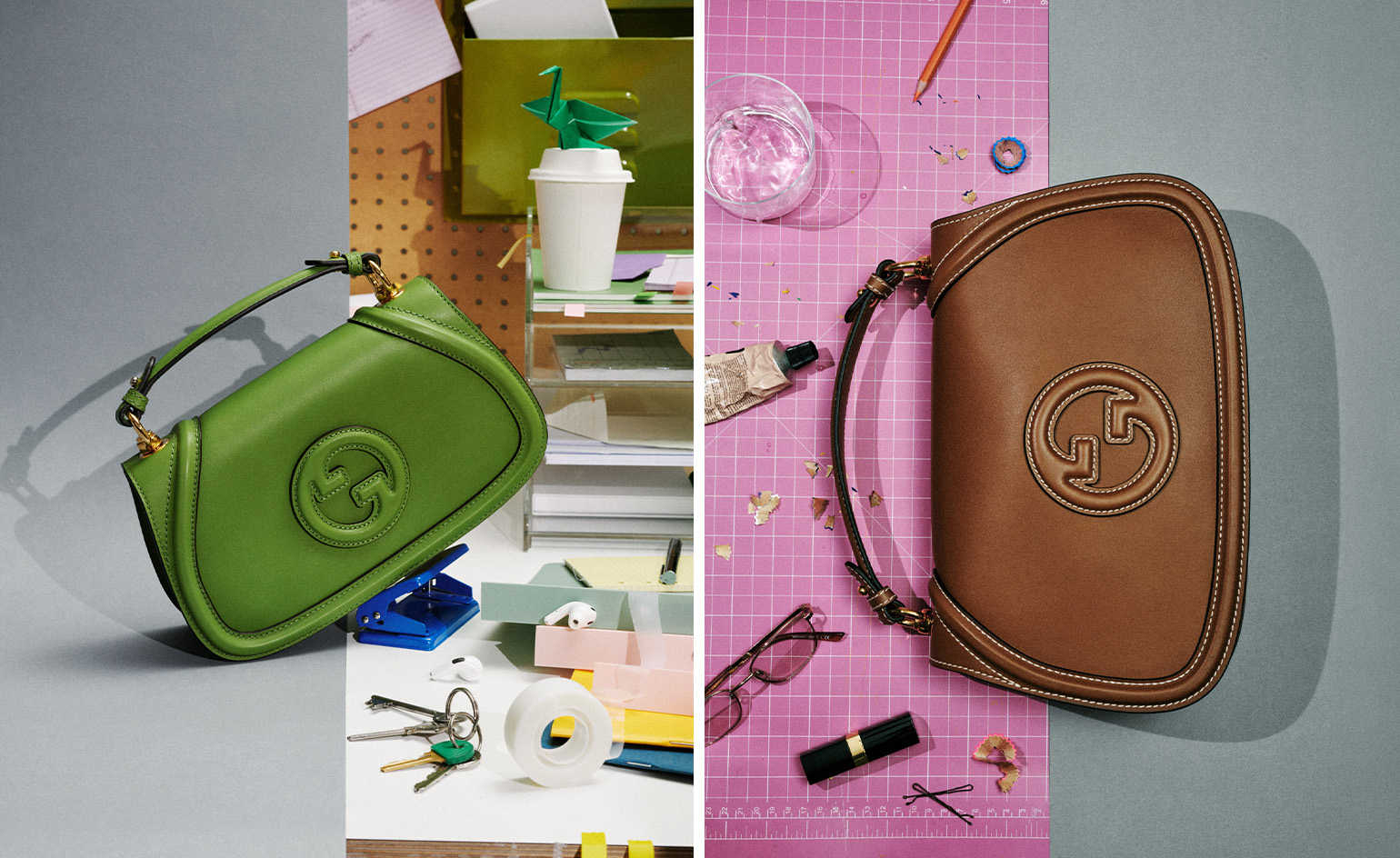 Gucci’s ‘Blondie’ bag revival sees the enduring 1970s accessory reimagined anew
Gucci’s ‘Blondie’ bag revival sees the enduring 1970s accessory reimagined anewFirst shown at Sabato De Sarno’s Gucci Cruise 2025 show in London, a new iteration of Gucci’s beloved ‘Blondie’ bag fuses 1970s insouciance with a crisp modernity
By Jack Moss
-
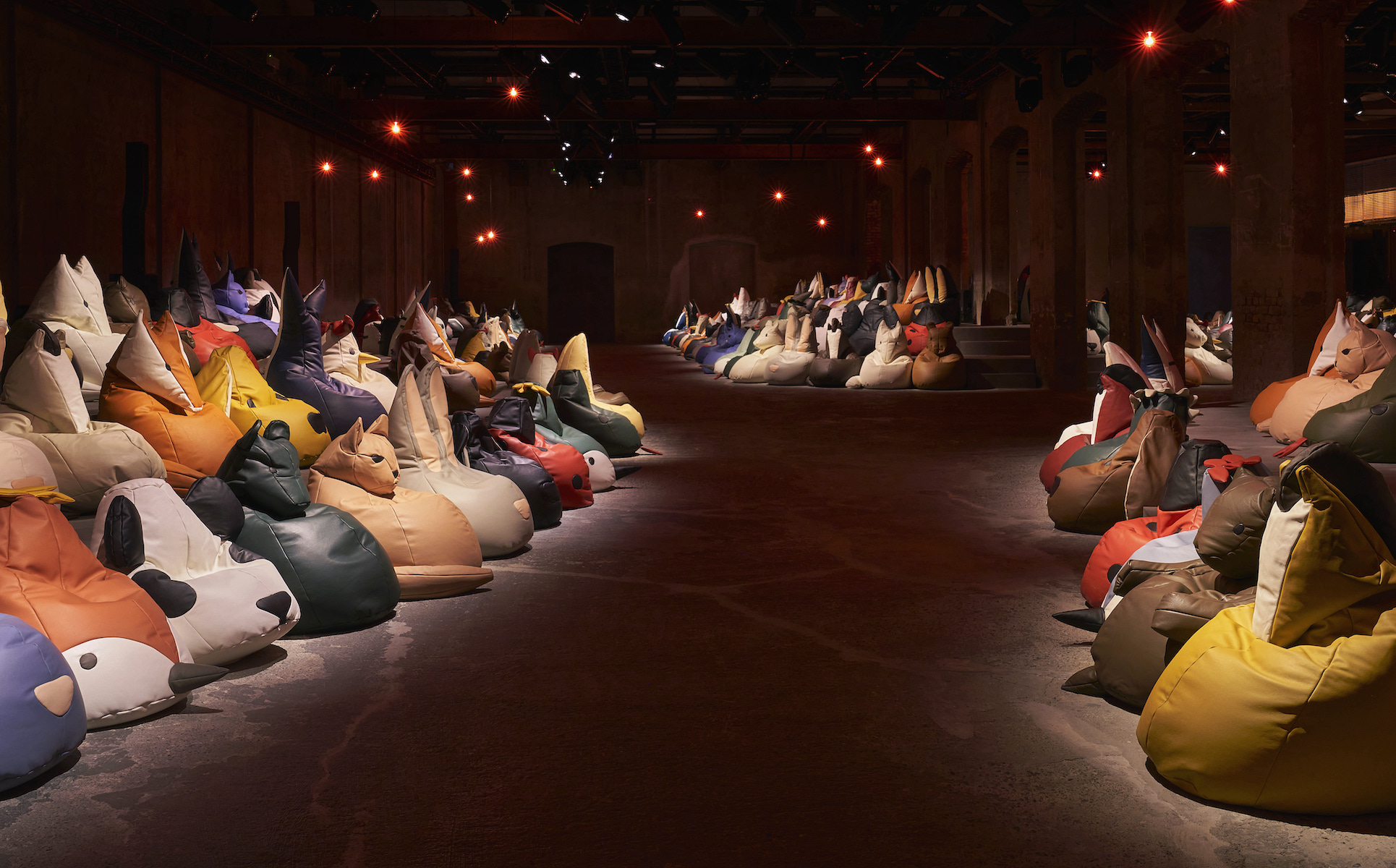 The breathtaking runway sets of S/S 2025, from beanbag animals to a twisted living room
The breathtaking runway sets of S/S 2025, from beanbag animals to a twisted living roomWallpaper* picks the best runway sets and show spaces of fashion month, which featured Bottega Veneta’s beanbag menagerie, opulence at Saint Laurent, and artist collaborations at Acne Studios and Burberry
By Jack Moss
-
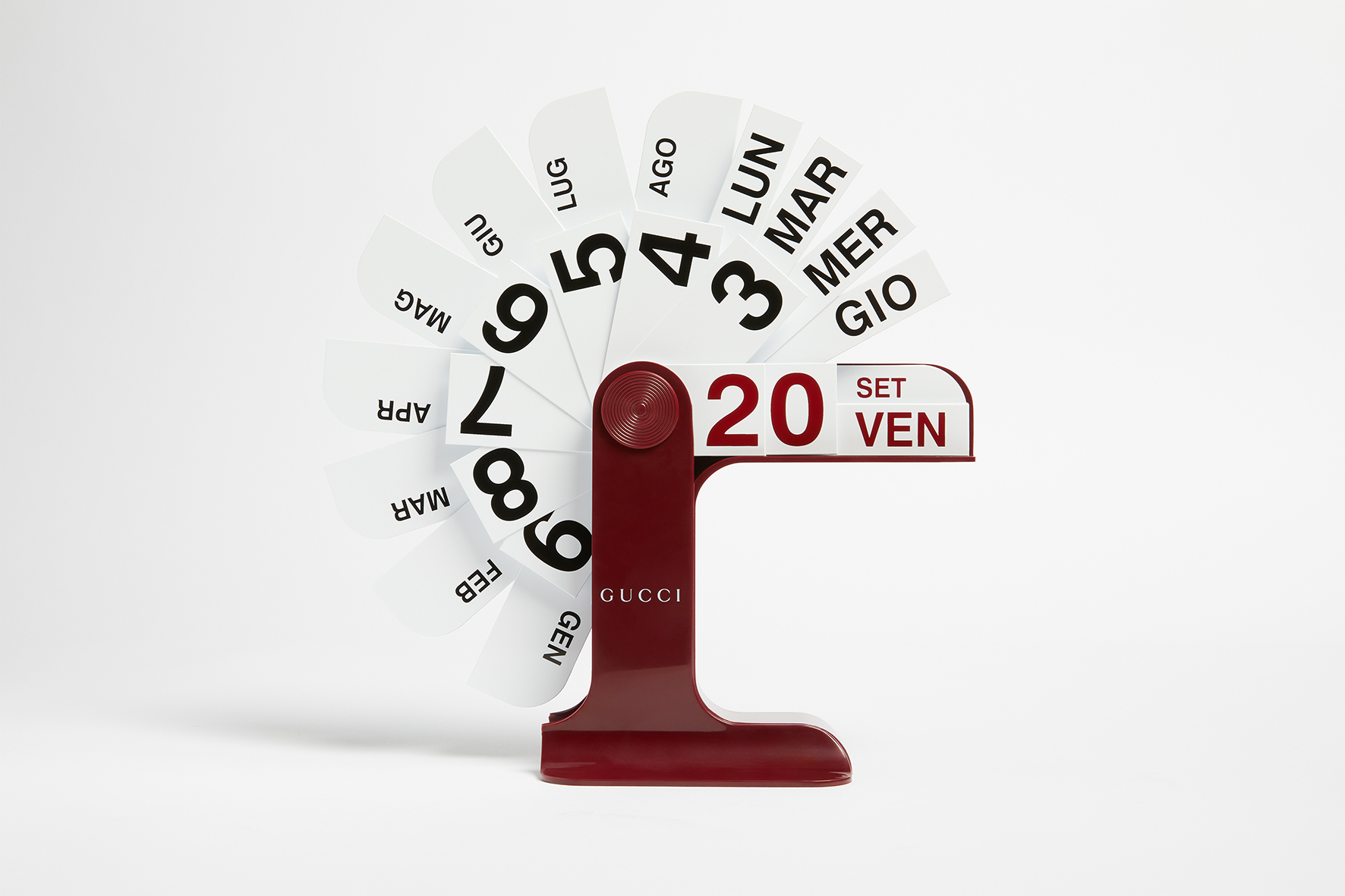 The invitation for Gucci’s latest show was a reissued Enzo Mari design classic
The invitation for Gucci’s latest show was a reissued Enzo Mari design classicMilan Fashion Week’s best invitation came from Gucci – a reissue of Enzo Mari’s ‘Timor’ perpetual calendar in the Italian house’s signature ‘Ancora’ oxblood red
By Jack Moss
-
 Milan Fashion Week S/S 2025 highlights: Dolce & Gabbana to Bottega Veneta
Milan Fashion Week S/S 2025 highlights: Dolce & Gabbana to Bottega VenetaWallpaper* fashion features editor Jack Moss selects the best of Milan Fashion Week S/S 2025, from Dolce & Gabbana’s homage to Madonna to childlike wonder at Bottega Veneta
By Jack Moss